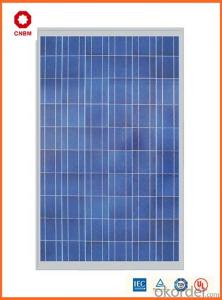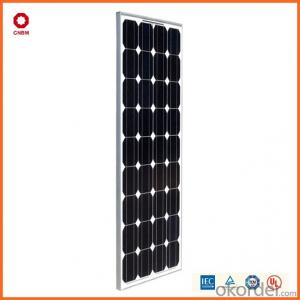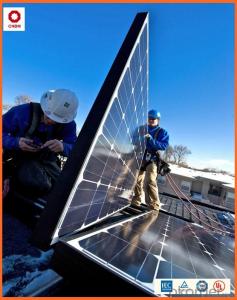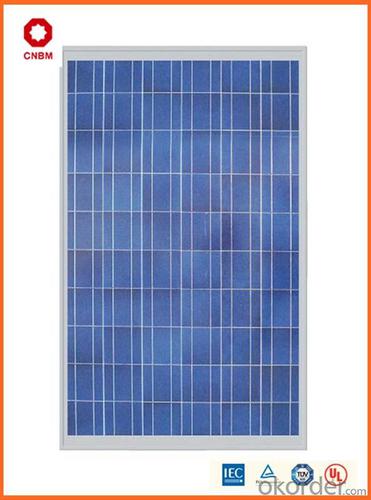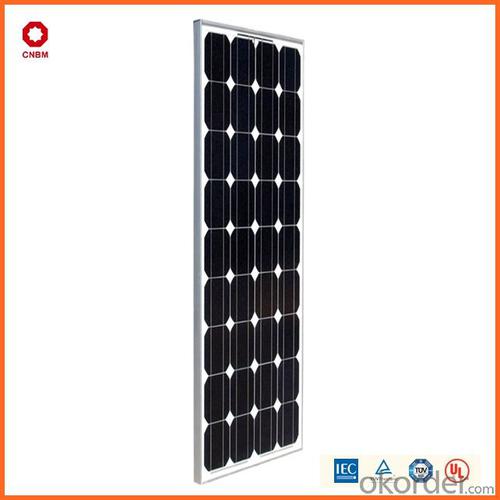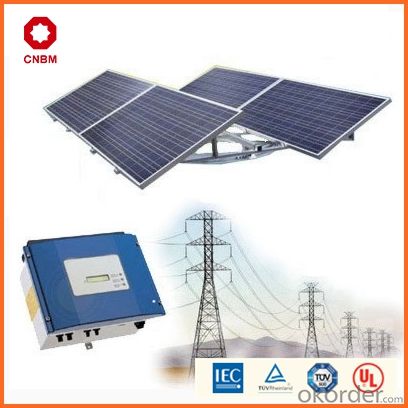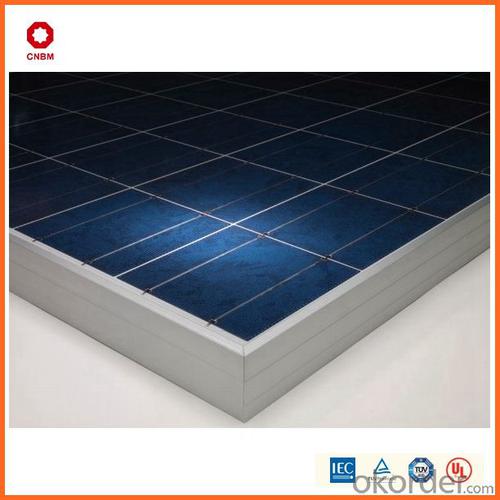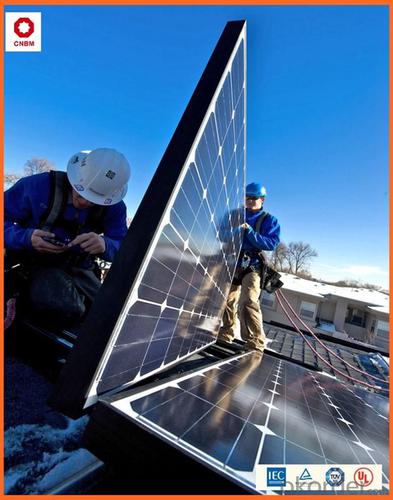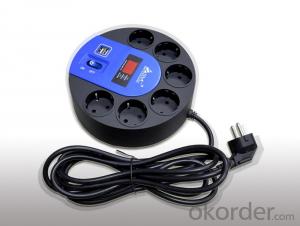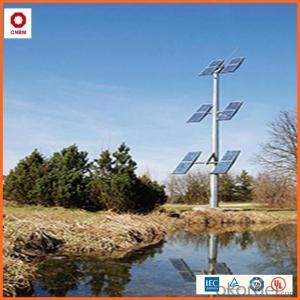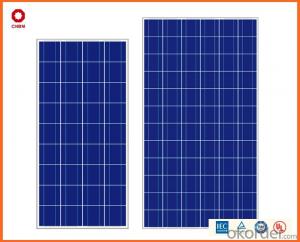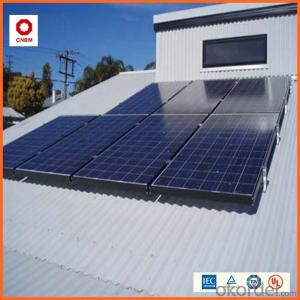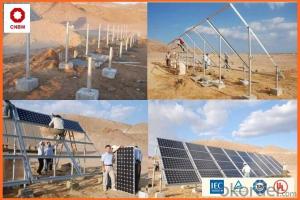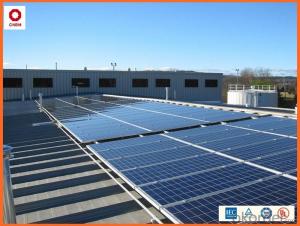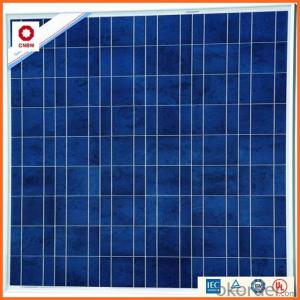135w Small Solar Panels in Stock - Solar Energy Systems Maple Grove - China Manufacturer
- Loading Port:
- China main port
- Payment Terms:
- TT OR LC
- Min Order Qty:
- 1 watt
- Supply Capability:
- 10000000 watt/month
OKorder Service Pledge
OKorder Financial Service
You Might Also Like
Specification
Product Description:
Hot Sale !!! Quality and Safety of Small Poly Solar Panel 5w~150w
1. Rigorous quality control meets the highest international standards.
2. High-transmissivity low-iron tempered glass, strong aluminium frame.
3. Using UV-resistant silicon.
4. IS09001/14001/CE/TUV/UL
Warranties of Small Poly Solar Panel 35~85w
1. 10 years limited product warranty
2. 15 years at 90% of the minimal rated power output
3. 25 years at 80% of the minimal rated power output
Specification
Characteristics of Poly solar panels CNBM (245-320W) | |||||
Max Power Voltage Vmp(V) | 30.3 | 30.8 | 31.1 | 31.4 | 31.85 |
Max Power Current Imp(A) | 7.60 | 7.64 | 7.73 | 7.81 | 7.85 |
Open Circuit Voltage Voc(V) | 36.1 | 36.6 | 37 | 37.3 | 37.68 |
Short Circuit Current Isc(A) | 8.50 | 8.55 | 8.65 | 8.75 | 8.85 |
Max Power Pm(W) | 230W | 235W | 240W | 245W | 250W |
Temperature Coefficient of Cells Poly solar panels CNBM (245-320W) | |
NOCT | 45± 2 |
Temperature Coeffucients of Isc | 0.0492 |
Temperature Coeffucients of Voc | -0.3374 |
Temperature Coeffucients of Voc | -0.4677 |
Mechanical Data of Poly solar panels CNBM (245-320W) | |
Dimension | 1638 × 982 × 40 mm |
Weight | 19.5 kg |
No. of Cells and Connections | 60 (6 ×10) |
Tolerance | 0 ~ + 5 W |
Cell | Monocrystalline Cell 156 × 156 mm |
Packing | 624 Pcs/40ft(H) Container |
Limits of Poly solar panels CNBM (245-320W) | |
Operating Temperature | -40 to +85 |
Storage Temperature | -40 to +85 |
Max System Voltage | 1000VDC(IEC) / 600VDC(UL) |
Features of our products:
• High conversion efficiency mono/poly-crystalline amorphous silicon solar cells
• Modules incorporate high performance bypass diodes to minimize the power drop caused by shading
• High transmittance, low-iron tempered glass
• High performance EVA encapsulant to prevent destroying and water.
• AI frame: without screw, corner connection. 8 holes on the frame can be installed easily
• Good performance of preventing from atrocious weather such as wind and hails
• Certifications: CE IEC TUV VDE UL, Class I
• 10 years 90% power output warranty

Shipping of Small Poly Solar Panel 35~85w
By Sea | Delivery from Shanghai or Ningbo seaport |
By Air | Departure from Shanghai Pudong Airport |
By Express | Post by DHL, EMS, UPS, TNT. |
Features of our products:
• High conversion efficiency mono/poly-crystalline amorphous silicon solar cells
• Modules incorporate high performance bypass diodes to minimize the power drop caused by shading
• High transmittance, low-iron tempered glass
• High performance EVA encapsulant to prevent destroying and water.
• AI frame: without screw, corner connection. 8 holes on the frame can be installed easily
• Good performance of preventing from atrocious weather such as wind and hails
• Certifications: CE IEC TUV VDE UL, Class I
• 10 years 90% power output warranty
As a professional Solar Panel manufacturer and Supplier in China, we have our customers come around the whole world and our specialization has got a worldwide recognition. Meanwhile, with our superior quality, competitive price, prompt and excellent service, As main role in trade section of CNBM Group, CNBM International Corporation supplies products including Monocrystalline Solar Panel, Polycrystalline Solar Panel ( multicrystalline silicon Solar Panel) have received and enjoyed famous reputation in many countries and regions in the world.
- Q: How do solar energy systems impact energy access in developing countries?
- Solar energy systems have a significant positive impact on energy access in developing countries. These systems provide a sustainable and reliable source of electricity, especially in regions with limited or no access to the traditional grid. By harnessing the abundant sunlight, solar energy systems help bridge the energy gap, bringing power to remote communities, schools, hospitals, and households. This not only improves the quality of life for individuals but also supports economic development, enhances educational opportunities, and enables access to essential services such as healthcare and communication. Additionally, solar energy systems reduce reliance on fossil fuels, mitigating environmental pollution and combating climate change. Overall, solar energy systems play a crucial role in expanding energy access, empowering communities, and fostering sustainable development in developing countries.
- Q: How do solar energy systems integrate with other renewable energy sources?
- Solar energy systems can integrate with other renewable energy sources through a process called hybridization. This involves combining solar power with sources like wind, hydro, and geothermal energy to create a more reliable and efficient energy system. By diversifying the sources, a hybrid renewable energy system can provide a consistent power supply even when one source is not producing at optimal levels. Additionally, integrating solar energy with other renewables can help balance the grid, reduce reliance on fossil fuels, and contribute to a more sustainable and resilient energy future.
- Q: Can solar energy systems be used for powering electric vehicle solar charging stations at highways?
- Yes, solar energy systems can be used to power electric vehicle solar charging stations at highways. Solar panels can be installed along the highways or at charging stations to harness sunlight and convert it into electricity. This renewable energy can then be used to charge electric vehicles, providing a sustainable and environmentally friendly solution for transportation.
- Q: Can solar energy systems be installed on historic buildings?
- Yes, solar energy systems can be installed on historic buildings. However, it is crucial to carefully consider the design and installation process to ensure minimal visual impact and preservation of the building's historic character. Additionally, the installation should be done in compliance with local regulations and guidelines to protect the architectural integrity of the historic structure.
- Q: Can solar energy systems be used in powering movie theaters or entertainment venues?
- Yes, solar energy systems can definitely be used to power movie theaters or entertainment venues. These systems can be installed on the roof or surrounding areas of the facility to generate clean and renewable energy. With advancements in solar technology, such as more efficient panels and energy storage solutions, it is increasingly feasible to meet the high energy demands of these venues. Additionally, the use of solar energy can reduce operating costs, contribute to environmental sustainability, and serve as a positive example for promoting renewable energy adoption in the entertainment industry.
- Q: Are there any disadvantages or limitations to using solar energy systems?
- Yes, there are some disadvantages and limitations to using solar energy systems. Firstly, solar panels can be expensive to install, although the cost has been decreasing over time. Additionally, the amount of electricity generated by solar panels is dependent on weather conditions, meaning that solar energy may be less reliable during cloudy or rainy periods. Moreover, solar panels require a significant amount of space for installation, which can be a challenge for urban areas with limited available land. Finally, solar energy systems are currently unable to store energy efficiently, resulting in a reliance on traditional power sources during nighttime or periods of low sunlight.
- Q: Can solar energy systems be installed on the ground?
- Yes, solar energy systems can be installed on the ground. In fact, ground-mounted solar systems are a popular choice for both residential and commercial applications. These systems typically consist of solar panels mounted on a structure or framework that is anchored to the ground. Ground-mounted systems offer several advantages over rooftop installations, such as increased flexibility in system design, easier access for maintenance and cleaning, and the ability to optimize the orientation and tilt angle of the panels for maximum energy production. Additionally, ground-mounted systems can be installed in areas with limited roof space or where the roof is not suitable for solar panel installation. Overall, ground-mounted solar energy systems provide a practical and efficient way to harness the power of the sun for electricity generation.
- Q: What is a solar inverter and what does it do?
- A solar inverter is an essential component of a solar power system that converts the direct current (DC) electricity produced by solar panels into alternating current (AC) electricity, which is used to power our homes and businesses. It is responsible for optimizing the energy output from solar panels and synchronizing it with the electrical grid.
- Q: What are the different mounting options for solar panels?
- The different mounting options for solar panels include roof mounts, ground mounts, pole mounts, and tracking mounts. Roof mounts are the most common and are installed directly on the roof of a building. Ground mounts are placed on the ground and offer flexibility in terms of positioning and tilting. Pole mounts are installed on poles or posts, suitable for areas with limited space or uneven terrain. Tracking mounts are advanced systems that move the solar panels to track the sun's position throughout the day, maximizing energy production.
- Q: Can solar energy systems be used in rural areas without access to the grid?
- Yes, solar energy systems can definitely be used in rural areas without access to the grid. In fact, solar power can be an ideal solution for off-grid locations as it harnesses energy from the sun and converts it into electricity without the need for traditional power sources. Solar panels can be installed on rooftops or in open areas to capture sunlight, which is then converted into usable electricity through an inverter system. This energy can be used to power various appliances and devices, providing electricity for lighting, charging mobile phones, running small appliances, and even powering agricultural equipment or water pumps. Additionally, excess energy generated during the day can be stored in batteries for use during nighttime or cloudy days. Solar energy systems offer a sustainable and reliable source of electricity for rural communities, reducing their dependence on expensive and unreliable fossil fuel-based generators or traditional power grids.
Send your message to us
135w Small Solar Panels in Stock - Solar Energy Systems Maple Grove - China Manufacturer
- Loading Port:
- China main port
- Payment Terms:
- TT OR LC
- Min Order Qty:
- 1 watt
- Supply Capability:
- 10000000 watt/month
OKorder Service Pledge
OKorder Financial Service
Similar products
Hot products
Hot Searches
Related keywords
